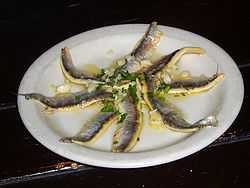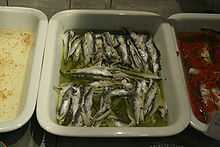Boquerones en vinagre
| Boquerones en vinagre | |
|---|---|
 | |
| Course | Hors d'oeuvre |
| Place of origin | Spain |
| Main ingredients | Anchovies, vinegar, garlic, parsley, sometimes olive oil |
|
| |

Boquerones en vinagre are a type of appetizer or tapa, meze frequently found in south Spain.[1] The central ingredient of the dish are the boquerones, fresh anchovies. The fillets are marinated in vinegar or a mixture of vinegar and olive oil, and seasoned with garlic and parsley. It is commonly served with beer or soft drinks, and rarely with wine.[1]
Characteristics and presentation
Fresh anchovy fillets, which initially have a brown colored meat, are cleaned, de-scaled, and submerged in a bath of salt and water for 3 hours and vinegar for 6 hours in a cool place. The fillets slowly turn white as the vinegar reacts with the fish. Once having gone through this process, and the liquid has been drained, they are seasoned with minced garlic, olive oil and parsley. An alternative preparation is to submerge the fillets in a mixture 3:1 of vinegar and olive oil (it can be replaced by sunflower oil), already seasoned with garlic, parsley and salt, for two days. They are served cold with beer, rather than wine, since they already contain vinegar.
The dish is very popular as a tapa in the south of Spain served in restaurants and bars, especially during the hottest summer months. They are garnished with capers or olives and accompanied by potato chips. The prepared fish can be bought commercially, requiring only additional garlic and parsley.
Health concerns
Anchovies can concentrate domoic acid, which causes amnesic shellfish poisoning in humans, sea mammals, and birds.[2] If suspected, medical attention should be sought. Anchovies also contain a high level of uric acid, a build-up of which can cause the inflammatory condition known as gout.
Spanish health laws require the previous freezing of the anchovies when prepared in vinegar, in order to avoid the survival of any Anisakis larvae, even though this parasite is rarely found off Spanish coasts.
See also
References
External links
 Media related to Boquerones en vinagre at Wikimedia Commons
Media related to Boquerones en vinagre at Wikimedia Commons